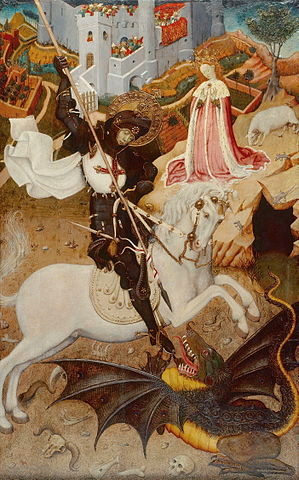
The Knights of St George
From the north to the south, from the west to the east
we will fight ev'ry monster and slay ev'ry beast
Over hill, over vale, on the sea or land
not a serpent nor wyrm shall be spared our hand
For every man and woman we strive
to protect them all we pledge our lives
All creatures foul shall know our might
Righteous! Fearless! Saint George's Knights!
- Extract from the traditional mantra-turned-drinking-song of the Knights of St George1).
Background
 Despite the name, very few of the Knights are actual knights in the usually understood sense. They are a large but widespread collection of men and women who seek to defend their homes and their country from the more vicious and aggressive supernatural beasts that arrived in Britain in the wake of the fey. The order welcomes all who would stand against these threats, be they old or young, human or Seelie; they need only be willing to take arms against the beasts and monsters that prey on the innocent.
Despite the name, very few of the Knights are actual knights in the usually understood sense. They are a large but widespread collection of men and women who seek to defend their homes and their country from the more vicious and aggressive supernatural beasts that arrived in Britain in the wake of the fey. The order welcomes all who would stand against these threats, be they old or young, human or Seelie; they need only be willing to take arms against the beasts and monsters that prey on the innocent.
Though originating in England, the various rulers of Britain (some more willingly than others) have seen the necessity of the Knights of St George in protecting their lands. As such, the Knights can travel up and down the country with little trouble and are often given better than usual treatment at local taverns. Their mode of operation varies from nightwatchmen to bounty hunters, depending on the work available or simply their own preferred methods. Calls for aid from local communities can readily be found at the guildhalls, which also offer accommodation for members of the order. Some choose to align themselves with a particular city or guildhall and work in the manner of a watchman, answering local calls for aid. Others will tour the country, helping where they find trouble - these are particularly welcome in those villages too small to host a permanent Knight. Others choose to specifically hunt down the fey creatures, venturing deep into the wilderness for extended periods of time in an effort to eradicate the beasts from the land. All, however, must uphold the values of the Knights of St George, helping when they are called upon and asking for little in return.
Origin
The Fey did not come to Britain alone; in their wake came all manner of beasts and creatures, things of myth and legend that would lie in the dark and prey on the unwary traveller – or even the wary one. As the number of tales of such things grew, so did the severity of their attacks on people across the country. Fear that the King might be in danger from these creatures lead to the founding of the Knights of St George: a special subdivision of the royal guard chosen for their ability to cope with unforeseen threats. These creatures could strike in any number of different ways and very little about them was truly known or understood.
The Knights, when not on direct duty protecting the King, would travel the country, seeking out the various monsters to learn how best to vanquish them. Through doing this, they soon realised that the local population, particularly in more rural areas, was far more in need of defending than the King; the monsters would typically avoid larger population centres and would much more regularly be met on the roads or in the wilds, picking the softer targets of small villages over the more well defended towns and cities. The Knights put the matter before the King and were granted the King's blessing to extend their purview, protecting now both King and country.
Their numbers quickly grew, with many a young person jumping at the chance to prove their worth or avenge loved ones who had been lost to the monsters. Taverns or even farmhouses would welcome the roaming bands of Knights, offering food and board in exchange for their protection. Some of these became lodgings dedicated to the Knights, and eventually permanent guildhalls were established in the towns which found themselves particularly prone to monster attacks. Many Knights still prefer the nomadic life, often having joined the order because they had lost everything to the beasts and were more than willing to live a more solitary life in the name of vengeance.
Despite having grown considerably since the early days, the Knights are still too small a force to provide truly comprehensive protection. Guildhalls serve as hubs for the Knights, a place to converse with brothers- and sisters-at-arms and find out about the latest monster sightings, but most assignments will involve traveling out to more remote areas. The work of the Knights of St George is never done. Even the more senior members are still expected to actively participate in the slaying of monsters and regularly travel up and down the country, applying their wisdom and experience where they are needed most.
Membership Requirements
It would be very unusual for someone to progress very far in the ranks without at least moderate skill in something related to tracking down and/or dispatching monsters. Aside from that, the Knights of St George have few actual requirements for membership. The order is traditionally closely affiliated with the Catholic Church of England, and its influence can still be felt. However, the order will welcome anyone willing to join the cause and being a dedicated Christian is not strictly a condition for joining the ranks. All Knights are expected to follow the law and uphold the values of chivalry, though, which may be a problem for members of certain other faiths.
People
Sir Francis
A strong and capable warrior, respected and well liked by just about everyone. Despite his seniority, he would always rather risk his own life than those of any under his command. He is the very model of a modern Knight of St George and is the popular favourite to take over as successor to the Duke.
Lady Patience
Rumour has it that she was the youngest recruit to ever beat the Duke in a duel. A Seelie master of both sword and spell, she is one of the most legendary members of the Knights. Despite her extreme dedication to the cause, she often appears preoccupied, or becomes lost in thought at apparently trivial concerns.
The Duke
A soldier so old that most now have never even heard his real name, let alone remember a time when he was not around. One would do well not to mistake his years for weakness, however – it is not through luck that he has managed to live this long. Even now he is more than a match for most of the other members of the Knights in combat, and there is not a single one who can compare to him in terms of wisdom and experience.
Rank
One's rank within the order is a measure of competence and respect. Lower ranks must abide by their superiors' decisions, while those of higher rank carry the responsibility and have much more expected of them.
Squire
New recruits are known as Squires, whether or not they are apprenticed to a specific Knight. They typically receive training from the more experienced members in exchange for carrying out menial tasks, such as looking after the horses and fetching supplies. The lifestyle of a Squire depends on that of the Knight or Knights they choose to follow. Even if a Squire has no specific master, they usually will not last long unless they are accompanied by more skilled members of the order. That said, there are a small number of self-trained Squires who were careful enough to survive to the point of being recognised as a Knight proper. By default members of this faction start as a Squire
Knight
Members of the order who have proven themselves capable are given the rank of Knight. The exact duties of a Knight will vary, depending on how they choose to apply themselves. Members with this rank gain access to the shared armouries of the Knights of St George as well as a good deal of respect from the civilian population. A Knight may or may not take on a specific Squire as an apprentice, but will be expected to offer advice to any Squire who asks for it. You may start as a Knight if you take the Rank (St. George) +1 quirk.
Knight Constable
As the order expanded and permanent halls established, the Knights found themselves in need of people to manage these establishments and aid in the organisation of the rest of the Knights. Though slightly more of an administrative position, many Constables do still enjoy the occasional outing to take on the monsters themselves. A Constable will be in charge of overseeing a particular guildhall and deciding which threats take priority in the local vicinity. They are also expected to make regular reports to the Duke. You may start as a Knight Constable if you take the Rank (St. George) +2 quirk.
Thane
The Thanes are a selection of the most senior and trusted Knights who act as the Duke's council. The council is not a closed circle, however; any Knight may request permission to sit in on an official council meeting and even to have their views heard. In practice, few ever bother - a permanent position on the council is gained through trust and respect and most Knights are more than happy to let the chosen Thanes worry about the bigger picture. The council decides on which areas are most in need of protection or efforts of eradication; most of them are also fearsome warriors, and are first choice - as well as first to volunteer - when particularly vicious beasts rear their ugly heads. You may not start as a Thane.
Duke/Duchess
The Duke or Duchess is the figurehead of the Knights of St George, a first among equals of all of the Knights. The current Duke has held the position for so long that few, if any, remember his real name, and he is referred to simply as “the Duke”. You may not start as The Duke.
Faction Quirks
Hunted (-2)
Maybe it follows you by day, a dark shape on the moors; maybe you've seen it at night, eyes shining in the dark; or maybe you've never seen it at all. Whatever it is, it is coming, and sooner or later, it will find you.
Your Reputation Precedes You (-1/+1)
For one reason or another people have probably heard about you, and will often know your name if not your face. Only you know if the things they have heard are actually true.
(+1): You are known for your valiance, skill, or acts of courage. Better treatment is not uncommon after giving your name at an inn, for example.
(-1): Your reputation precedes you. It is not a good reputation.
